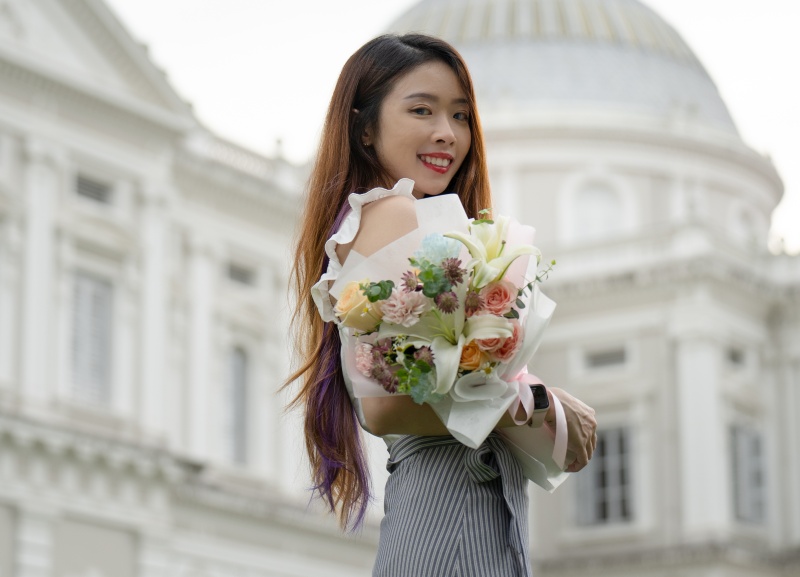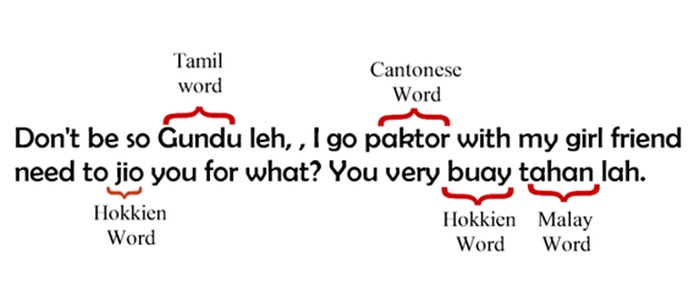
Sure anot? Yes sure… In Singapore, Singlish is often used when people feel at ease speaking to one another. Most people in Singapore would agree that Singlish plays an integral part in their daily communication. Hence it doesn’t come as a surprise, Singlish is responsible for many Singaporeans getting hitched. A popular online blog in Singapore quoted Singlish as: “It’s objectively one of the best and most romantic and lyrical languages in the whole wide world.”
Singapore is a melting pot of different races and cultures. Singlish first emerged when Singapore gained independence some half a century ago, and English was decided to be the common language for all its different races. Singlish came about out of the necessity to communicate with different cultures in Singapore.
Unlike other pidgin or creole English, Singlish has evolved from a confluence of very diverse languages. The language has grown from a predominantly mix of Malay, Hokkien (Chinese dialect) and English languages to now, Tamil, Teochew, Cantonese and Mandarin and it continues to evolve.
Some say, Singlish is the most efficient language in the world. Singaporean have a way of condensing really long sentences into short ones that every Singaporean understands but with nuances that are difficult to explain to anyone else.
Why do Singaporean use Singlish?
Singlish is spoken when you are in a familiar and comfortable situation and you need to express yourself very little to get your message across. That’s what language is all about.
Singlish also offer another dimension to not just putting across a message but emotion too. Just like how emojis are being used so widely today. Instead of an ‘image’ emoji, Singlish offers several layers of tonality to project the different stage of emotions when the message is communicated without having to say it in another thousand words. Tonality is a crucial aspect of communication as it portrays a person’s emotion when expressing the words.
An example would be the word ‘can’. Just like the English term, “can” means to be able to. However, in Singlish it is used more efficiently and effectively in different tonality to mean different expressions:
– ”Can.” Means yes! Instead of answering “yes, I can do that” you just reply with “can”
– “Do this for me, Can?” means pleading to someone to do this (task) for you
– “Can not lah” –means it cannot be done.
– “Cannnn..” means it can be done with pleasure or with little or no effort.
– “Sure can” or ‘”Sure can lah” – means saying ‘able to’ confidently or unequivocally able to.
– “Can anot?” means are you sure you can do it?
– “Can meh?” or “Can bo?” means asking if is doable or feasible?
Another very versatile word is “OK lah”.
– “How are you? Are you ok?” means how are you doing?
– “Ok lah” means I’m fine or to agree hastily or reluctantly
– “Ok lor” means I’m fine, I guess (generally I am fine but not great)
– “Ok lah!” means I’m definitely fine
– “Ok meh?” means Am I ok? Not sure if I am ok.
Singlish words are also known for their adaptability. A word such as ‘Shiok’ can be used in several situations. It can mean an exclamation that expresses great satisfaction and pleasure. It can also used alone or as an adjective, and can describe good weather, delicious food or even feelings.
- Standard English: Today’s weather is really nice.
- Singlish: Today weather very shiok.
- Standard English: This bowl of laksa is delicious.
- Singlish: This laksa damn shiok.
- Standard English: I love easting ice cream when it’s so hot.
- Singlish: So hot, eat ice cream very the Shiok!
The Singlish word ‘Paiseh’ — a Hokkien term that verbalized embarrassment or shyness and is also used as an alternative to “I’m sorry”. Examples are:
- Standard English: I’m sorry I got the time wrong again.
- Singlish: Paiseh, I got the time wrong again.
- Standard English: Don’t be shy, feel free to help yourself with the food
- Singlish: Don’t paiseh lah, help yourself with the food.

When is Singlish use?
These days, most Singaporeans are able to comfortably switch between Singlish and standard English. Singlish is not used in every conversation and Singaporeans often toggles between Standard English and Singlish depending on situation and who they talk to. That is why, many foreigners find it rather fascinating to hear their Singaporean colleagues speaking much appreciated Standard English during meetings in the office and switched to an incomprehensible Singlish when they are in a less formal setting like in the hawker centres.

Don’t be so Gundu leh, , I go paktor with my gf need to jio you for what? You very buay tahan lah.
This is an example of how a mixed of 5 different words from 5 different languages (or dialects) are formed into a Singlish sentence. Goondu (goon-doo) comes from the Tamil word for ‘fat’ and is used to describe an idiot. Paktor originates from the Cantonese word 拍拖 which means ‘to date’. Jio is a Hokkien word meaning invite, same as the word ‘buay’ means ‘cannot’ . Where as ‘tahan’ is a Malay word mean tolerate or endure. The phrases “buay tahan” is a combination of Hokkien (buay) and Malay (tahan) which means ‘cannot’ and ‘tolerate’ respectively. Often used to express frustration over a situation. It is how you would say in English “I can’t stand this anymore”.
How Singlish is Used Romantically?
The art of Singlish romance is rooted at the heart of being comfortable and easy to speak freely with one another. Being comfortable, people instinctively lower their guard down and able to speak freely and more importantly from their hearts. Here are some examples of Singlish words and phrases: Singlish Terms You Need to Know if You’re Dating a Singaporean
Chiobu
Guy sees a beautiful girl and he is attracted to her. Instead of saying “She looks very beautiful and attractive.” , in Singlish – “That girl very Chiobu” . Chio-bu a Hokkien phrase that describes a female who is especially beautiful and hot like a babe.
Where Got La
It can also be used to coyly refuse compliments. When you compliment a girl on her looks by saying “You look very pretty today” , a typical English response would be ‘Thank you’. But when a person replies “Where got la” in Singlish, is an outwardly shy and modest way to say thank you.
Paktor
Paktor means to go out on a date with someone whom one is romantically involved with. It is well defined as a valid English word. The word originates from the Cantonese meaning “hitched together”. When someone asks “Why are you not free to join us for a drink ?” and the Singlish reply comes as “Sorry, I have to go paktor tonight.” It also mean that person has already a boyfriend or girlfriend.
Steady
“Steady” implies that a boy and a girl are in a serious relationship. The guy may ask the girl if she wants to be his girl friend by saying in Singlish – “Want to go steady?” or “Ai Stead Mai?” – which means “Do you want to be my girl friend?”
“Steady” is also used as a way to express “approval” or in response to a good suggestion or idea. When someone announces he or she got promoted. A typical Singlish response would be “Wah steady la…” or “steady man…”
Another addon to the word ‘Steady’ that is uniquely Singaporean is “Steady pom pi pi”. This phrase refers to someone who is able to hold their composure in competitive or intense situations to overcome challenges.
Yaya papaya
Yaya papaya describes someone who is proud and looks down on others. The word ‘Yaya’ is a Malay word meaning an arrogant person. So, when a girl describes you as ‘Yaya papaya’ means she probably regards you as arrogant and someone who like to show off.
Siao
Siao literally means ‘crazy” in Hokkien. Like the English word, is used to describe ‘disbelief’. For example, “You gotta be crazy to even think of this!” In a Singlish context, this is how a guy may say to a girl – “I know you for very long liao, I actually want to tell you .. I love you.. ” The girl retorts “Siao Ah? HeHe..” – a reaction in disbelief but secretly hoping to hear him say it.
Bo jio
Arguably the most overused words in Singapore, “Bo jio” is a Hokkien phrase that is surprisingly applicable to almost every situation in life. ‘Bo’ means no and “Jio” means invite. “Bo jio” literally means ‘ didn’t invite’. So when a girl tells you “Bo jio” – means why you didn’t ask her? Or She had expected you to invite her. This would generally mean she wants to go out with you and perhaps get to know you.
Bo Buay Hua
This directly translate from a Hokkien phrase meaning “didn’t buy flowers”. So when girl utters these words to a guy, she probably hinting to him to buy flowers or flower bouquet for her.
Want to buy BTO anot?
A well known yet subtle way of making a marriage proposal in Singapore. In Singapore, only couples who are ready to get married is allowed to purchase public housing, HDB or a BTO apartment. As applying for public housing requires the submission of documents including marriage certificates. And yes, if someone ask you if you want to buy a BTO or HDB, it means asking your hand for marriage. By the way, did you know “HDB” (a public housing estate) is in the Oxford English Dictionary?
I Love You Lah
Adapted from Quora, Chen Lukai
- “I love you lah” – Used when you are irritated from the constant question your girlfriend has been asking you “Do you love me?” repeatedly.
- “I love you lor” – Used when you grudgingly admit that you do love her. Like when your girlfriend has been asking you “Do you love me?” repeatedly.
- “I love you bah” Used when you admit that you do love her but imply that you actually have to think about it and it’s not clear-cut. Like when your girlfriend has been asking you “Do you love me?” repeatedly.
- “I love you meh” Used when you question the implication that you love her. Like when your girlfriend has been asking you “Do you love me?” repeatedly.
- “I love you leh”. Used when you think it’s a given that you love her, and they shouldn’t even have to ask. Like when your girlfriend has been asking you “Do you love me?” repeatedly.
- “I love you sia”. Used when you want to emphasise that you love her. Like when your girlfriend has been asking you “Do you love me?” repeatedly.
- -“I lagi love you.” Used when you admit that you love her. A lot. Like when your girlfriend has been asking you “Do you love me?” repeatedly.
- “Limpeh lagi love you.” Used when you admit that you love her. A lot. But with emphasis on the “I”. Like when your girlfriend has been asking you “Do you love me?” repeatedly.
- “I love you” Used when you want to say “I love you”. Not everything sounds different in Singlish.
Singlish Added To The Oxford English Dictionary
There are many Singlish (Singapore English) words that were added into the Oxford English Dictionary (OED). Some examples cited are: “blur”, meaning slow in understanding, “ang moh” (a light-skinned person, esp. of Western origin or descent; a Caucasian), “shiok” (cool, great; delicious, superb), “sabo” (to harm, inconvenience, or make trouble for; to trick, play a prank on) and “HDB” (a public housing estate). It is now considered acceptable to use “wah”, which OED says is used – especially at the beginning of a sentence – to express admiration, encouragement, delight and surprise, among others. ~ The Straits Times, May 2016
Nothing is Lost in Translation
As confusing as it may be, Singlish is also dynamic and filled with unique vocabulary, not to mention diversity. With Singlish, nothing is lost in translation if you understand it and have been living and interacting with the locals in Singapore long enough to appreciate the colourful, expressive and reflects the wit, humour, history and multiculturalism of Singaporeans. Singlish phrases are used in a succinct manner to reinforce a message across and to complement the English language. Is uniquely Singapore.
Written by: jjLee for 24HrsCityFlorist.com

Leave a Reply